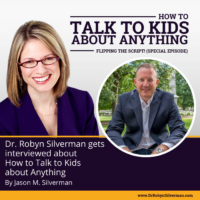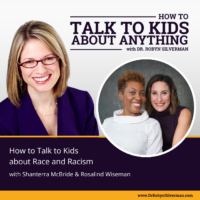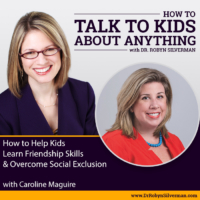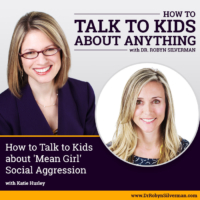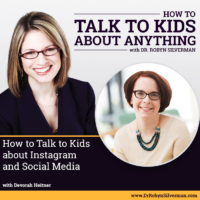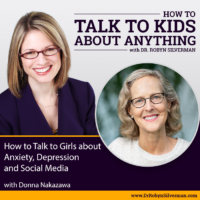Podcast: Play in new window | Download
Subscribe: Apple Podcasts | RSS | More
How to Talk to Kids about Equity, Racism and Social Justice
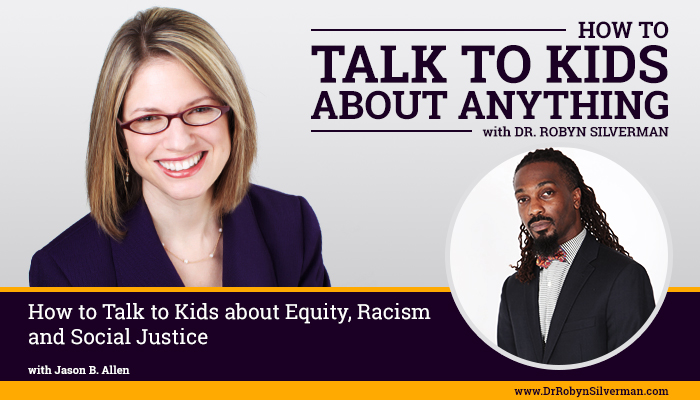
This podcast focuses on the conversations that need to occur around racism, inequities and social justice in a world where black and brown boys are routinely marginalized, mistreated and made to feel inferior. How can advocates, educators, parents and activists become mentors and guides for black and brown boys? How can we empower our young people to speak out and create change? How can we change the stereotypes of this group of young people by highlighting the good, changing our expectations and altering the old systems that no longer serve? Dr. Robyn Silverman speaks with educator, Jason B. Allen, about how we can make a difference.
Special guest: Jason B. Allen
It is no secret that many of our black and brown boys are marginalized, mistreated and made to feel inferior in today’s world. You’ve heard leaders call for systemic change- but that only happens when the people within our systems, help them to change. We need advocates,  educators and activists to help do this important work—to teach and guide us, as parents and coaches and prominent people in the lives of youth on how to help all our young people reach their potential. There are some uncomfortable conversations that must occur- about racism, about inequity, about social justice—with those young people who are on the receiving end of inequities as well as with those who are peers, friends, teachers and parents of those who must cope with these inequities every day. How do we talk to our kids about equity and social justice? How do we empower our young people to speak out and make change? And How do we present ourselves as mentors—or provide the mentors our children need- so that they have people to look towards who look like them so they can see where they can go with hard work and hopefully, a fair shot. For all of this, I turn to special educator, Jason B. Allen.
educators and activists to help do this important work—to teach and guide us, as parents and coaches and prominent people in the lives of youth on how to help all our young people reach their potential. There are some uncomfortable conversations that must occur- about racism, about inequity, about social justice—with those young people who are on the receiving end of inequities as well as with those who are peers, friends, teachers and parents of those who must cope with these inequities every day. How do we talk to our kids about equity and social justice? How do we empower our young people to speak out and make change? And How do we present ourselves as mentors—or provide the mentors our children need- so that they have people to look towards who look like them so they can see where they can go with hard work and hopefully, a fair shot. For all of this, I turn to special educator, Jason B. Allen.
Jason B. Allen is a Special Education teacher in Georgia. Jason has worked in Education for over fifteen years as a teacher and leader servicing students, families and communities. One way he uses his platform is by helping to improve ways to recruit, retain and empower Black male educators to advocate for social justice and equity through his work with Profound Gentlemen. As an education activist and blogger (EdLanta), Jason actively speaks and writes on ways to improve educational outcomes and is helping lift student voices in decisions to improve and reimagine education. He is a member of the Association of American Educators (AAE) and an AAE Foundation Advocacy Fellow and a 2017 YouCAN Advocates Program Alumni.
Important Messages:
 “As a Black male educator, I don’t just get to talk about it; I have to be about it. Every day I have an opportunity to shift the narrative on how Black boys—who will grow into productive citizens like me—are accepted, treated, perceived and depicted in the world. Black boys often show some of the highest levels of deficiency in areas of academics, behavior, discipline and attendance in schools.”
“As a Black male educator, I don’t just get to talk about it; I have to be about it. Every day I have an opportunity to shift the narrative on how Black boys—who will grow into productive citizens like me—are accepted, treated, perceived and depicted in the world. Black boys often show some of the highest levels of deficiency in areas of academics, behavior, discipline and attendance in schools.”- Change the narrative around Black boys: Sharing the stories of the black and brown boys in the classroom- what they would like to see, their struggles, how home and outside of the home plays a role.
- Data show that black boys struggled when it came to discipline in the schools—problems with policy and cultural dynamics. Story of Kalen- shows that building relationships with students can create positive change and enables better educational outcomes.
- Engagement- engage our students. Government doesn’t invest in family and community engagement in our public schools. (See Harvard School of Education under Karen Mapp). Engagement helps the kids who might have been left behind. We need to be intentional about what we are doing right now- having the conversations. What are you going through? How is this going for you? How is the classroom, this school, impacting you, positively or negatively? Then we lay out the variables. We start to do the problem-solving so that the things that they see teachers do in the classroom, they can see us doing in real time- that’s how you get the buy in.”
- The more we have the conversations, the easier they become.
- 2% of male educators of color in the classroom in America. Need for more social-emotional support for children of color in public schools. Resource- Demario Harmen Fort- Company is SpeakLight (see resources for info). Battling depression, anger issues- check that out.
- Children need to have representation in the classroom- but also in areas that impact the classroom like school boards- so if they don’t have a teacher who looks like them in classroom, they are still represented.
- Story- Ms. Thornton. Understood that the punitive systems were not working so she got together with the counselor and created a different outlet for Jason- one where he wrote down his feelings and journaled. “It took having a counselor who looked like me but also who didn’t look like me to provide a resource that worked.” “I’m from Buckhead and I have a family member in Bankhead but I want to meet you where you are.” (This, as opposed to harsher punishments where you cut off the communication- like through suspension or expulsion- cutting out the access and ability to mend that child’s heart or reach that child).
- Equity- curriculum and teacher diversity. Need culturally inclusive curriculum. Need to reflect on when we were our best but also those times in history when we were our worst—and talk about those. Students are asking for this- and want to see. They want to advance the voices of black, brown and mixed-race educators- that reflect all diversity in our communities.
- When you think of equity- that’s what we are fighting for and advocating for- to advance the voices of all people in our communities.
- These tough conversations about inequity and racism? This is what he is doing every day in his classroom.
- Need some more discussion about current events- it’s a way to reach students. What’s happening in society and our communities in an upfront and loving way.
- Influenced by family members- or can’t have some conversations with family members. How to deal when other people in the family believe differently than you? Need to talk about “the isms” in the classroom. Different generations, different beliefs, different experiences- and they want to insert their beliefs on others. This generation- let them voice their opinions and embrace their beliefs, we can see some growth. This is how you embrace the “all” the “all black men, all black women, all white people” are bad…look at individual people committing the acts and how we can hold them accountable.
- Drive the conversation around love.
- We are reactionary. You have to act quickly if it’s an emergency. But other situations- disrespectful, causing a friction- take a step back. Mediate in love to determine our actions.
- Someone shot in the community- how does this happen? For example, 2 adults having an argument- they aren’t thinking, their reaction caused harm to someone else. In that moment, we need to keep ourselves calm and determine how we want to react. Think of the people who were arguing- what role could you play to calm the situation down? Reflect. Use the cautionary tales to learn the lessons.
- Kids in his school are purposely getting into trouble so that they can go to his office to be heard.
- The struggles of black boys in American public schools who are in special education programs- it has been extremely difficult to empower them when they already have felt disconnected in schools to get them excited for planning for the future- especially college- because they are not seeing that in their communities- there isn’t a sense of urgency in their households. Lack of engagement and connection- especially during Covid- because lack of face to face.
- A lot of the time teachers are not teaching to a child’s learning style- and if they have special needs this becomes that much more important. Parents aren’t familiar with the idea of learning styles.
- Child with double hearing aid- how a child looks affects learning. Need lists. Drink water. Feel more independent. Responsibility. Routine. Patience.
- CREATING A CULTURE: Affirmations are very important. Motivational sayings. Create a different culture. They can make errors- but not failure. Make success possible. Success can look all different ways.
- How are we building culture program? How are we connecting the different subjects- plus recess and visual arts, discipline and attendance?
- What do you want to be? Think of three things that you want to impact that will leave a lasting legacy for you in the future. What do you want to be as a parent? As a teacher? As an activist? As someone who is a citizen here in the United States? Ensuring that all people are safe, respected and loved.
Notable Quotables:
-
-
- “As a Black male educator, I don’t just get to talk about it; I have to be about it. Every day I have an opportunity to shift the narrative on how Black boys—who will grow into productive citizens like me—are accepted, treated, perceived and depicted in the world. Black boys often show some of the highest levels of deficiency in areas of academics, behavior, discipline and attendance in schools.”
- “As an advocate and educator empowering black and brown boys, I also empower all of my students. Once people take the barrier of race away, that allows people from all walks of life- from different classes, cultures and spaces to, in time, to enjoy these stories and get a better understanding of different walks of life.”
- “Building relationships with students can create positive change and enables better educational outcomes.”
- “Engagement helps the kids who might have been left behind. We need to be intentional about what we are doing right now- having the conversations. We need to ask; ‘What are you going through? How is this going for you? How is the classroom, this school, impacting you, positively or negatively?’ Then we lay out the variables. We can then start to do the problem-solving so that the things that they see teachers do in the classroom, they can see us doing in real time- that’s how you get the buy in, that’s how you get the students to come into a realm ‘I want to be in control of my learning and be more engaged and be a better representation of who I am in and out of the classroom.’”
- “Children need to have representation in the classroom- but also in areas that impact the classroom such as school boards and state boards that create the curriculum and the pipelines that teachers come through because a lot of the time, it’s not that we don’t have the representation, we don’t have the access to funnel in teachers who want to reach various populations of students.”
- “When you think of equity- that’s what we are fighting for and advocating for-advancing the voices, not just of black educators, but our brown educators and our mixed-race educators. Because when we think about equity, what about families who are multi-cultural? How are we reaching those families?”
- “We need to discuss what’s happening in society and in our communities in an upfront and loving way. I want to stress ‘loving’ because as a black male in America, the stories are already created for us. A lot of times they are so negative, people begin to believe that ‘all black men are dangerous.’ ‘All black women are angry.’ All white people are racist.’ I have to walk those conversations back- everyone has free will. Everyone has a different experience. Everyone has a choice to make about how to act and react to certain things. That’s how we begin to dissect what’s happening.”
- “With this generation, if we give them the opportunity to voice how they feel and then embrace their opinions, we can begin to see some growth.”
- “Drive the conversation around love. The thing about love is that we can be upset in that moment, we can be disgruntled about what we witnessed, then we can take that moment to balance ourselves in love and determine what are going to be our action steps.”
- “Meditate in love to determine our actions. The way that you respond can have negative or positive effects on not just you but the people around you.”
- “Give students the time to reflect and use the cautionary tales of others to help eliminate those situations from happening in their own lives and in their communities.”
- “Feelings of hopelessness always connect to someone wanting to be heard, someone wanting to be seen, someone wanting to be appreciated.”
- “For those students who feel isolated, who feel hopeless, we have to go above and beyond making sure that what they need socially and emotionally is being met and a lot of the time that transfers over into the work that we do in the communities and in the household.”
- “Adolescence is a very strange land.”
- “Make success possible.”
- “Our job as mentors, guides, and advocates for black youth is to empower them to go beyond the negative stereotype that have been labeled for them and to create new stories.”
- “What do you want to be? Think of three things that you want to impact that will leave a lasting legacy for you in the future. We are all always changing. Right now, in this moment; What do you want to be as a parent? As a teacher? As an activist? As someone who is a citizen here in the United States? What do you want to be in regards to ensuring that all students, all families, all people are safe, respected and loved.”
-
Our job as mentors, guides, and advocates for black and brown youth is to empower them to go beyond the negative stereotype that have been labeled for them and to create new stories, says @jballen5 on #talktokids podcast.
Click To Tweet
Resources:
-
-
https://www.antoniomcfarland.com/book/college-is-possible
-
-
https://www.profoundgentlemen.org/
-
Perseverance in a Strange Land Book
Social Media for Dr. Robyn:
- facebook.com/DrRobynSilverman
- twitter.com/DrRobyn
- instagram.com/DrRobynSilverman
- facebook.com/HowToTalkToKidsaboutAnything
The post How to Talk to Kids about Equity, Racism and Social Justice with Jason B. Allen – Rerelease appeared first on drrobynsilverman.com.

